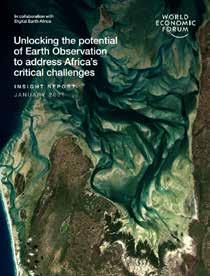
2 minute read
Africa could benefit $2-billion per year from Earth Observation
AFRICA COULD BENEFIT $2-BILLION A YEAR FROM EARTH OBSERVATION, HERE’S HOW
Could Earth Observation (EO) be one of the most valuable assets on which Africa can rely on? A report published by the World Economic Forum (WEF) in January in collaboration with Digital Earth Africa (DE Africa) suggests that the socioeconomic benefits of EO in Africa could be higher than $2-billion a year.
The report, which is titled “Unlocking the Potential of Earth Observation to address Africa’s critical challenges” can be accessed here, examines the economic potential of the DE Africa programme, which provides a platform to help translate EO into freely accessible data. DE Africa is the world’s largest open data cube, encompassing a land area of over 30-million square kilometres. The programme provides valuable insights into a range of issues, from water and agriculture, to urbanisation and deforestation.
DE Africa said in a statement in January that the report was developed following extensive examination of the readiness of African countries to effectively and efficiently grow their geospatial capabilities, integrated with careful study of the economic benefit of EO data adoption on specific sustainable development focus areas.
The report estimates that improved use of EO data could lead to an extra $500-million in yearly EO sales along with new job opportunities and increased revenue.
Better data, the report’s authors point out, could potentially be worth an extra $900-million a year thanks to water savings, productivity gains from farmers, and reduced pesticide usage.
EO could lead to better regulation of mining activity, with data enabling countries to track unregulated mining. The report states that EO data could lead to potential savings of at least $900-million from reduced environmental damage and fiscal evasion.

DE Africa Programme managing director Dr Adam Lewis said the initiative has through collaboration with key partners within Africa and around the world made “significant progress” in turning this potential into a reality.
“We are already seeing the benefits of EO in Africa. In Tanzania for example, the National Bureau of Statistics has been able to use the data to analyse water changes over time for Lake Sulunga, leading to better decisions for the populations living around the lake,” added Dr Lewis.
Benedict Mugambi, who’s the Head of Geographic Information Systems at the National Bureau of Statistics, has been monitoring the the water extent of the Lake Sulunga using the DE Africa Water Observation from Space (WoFs) analysis ready data service. The insights gained from this analysis are helping to inform evidence based policy decisions to support the communities living around the banks of the lake.
“Digital Earth Africa gives us the data and evidence to make better policies about how communities can use land and water for the best environmental and economic outcomes. But to be fully effective we must find a way to share the results with local people,” said Mugambi. ai










